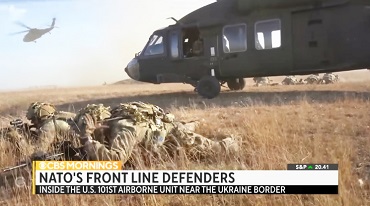The Australian Alert Service is the weekly publication of the Australian Citizens Party.
It will keep you updated on strategic events both in Australia, and worldwide, as well as the organising activities of the Citizens Party.
To subscribe to the Australian Alert Service, it's easy, and it's secure.
Lead Editorial
26 October 2022
Vol. 24 No. 43
The US President’s mobile “nuclear button”, often called the “football”, is increasingly and insanely a factor in the intensifying Russia-Ukraine conflict. Any doubt that the USA and UK, not Russia, were driving this conflict was ended when 30 House Democrats on 24 October released a signed letter to Biden urging him to initiate direct talks with Russia for a “proactive diplomatic push, redoubling efforts to seek a realistic framework for a ceasefire” in Ukraine. Within a day the chair of the progressive caucus which issued the call, Pramila Jayapal, retracted the letter, pathetically blaming a staffer for issuing it without vetting. That’s the cover story: clearly, the bipartisan US “war party” smashed these Democrats for undermining their war agenda.
This comes amid a dramatic escalation of the war drive. On 23 October, Russian Defence Minister Sergei Shoigu called his counterparts in the USA, UK, France and Turkey to convey evidence of a planned provocation by Kyiv to use a “dirty bomb”. A conventional bomb rigged with nuclear material, such a device spreads radiation upon detonation. Russian state-owned news agency RIA Novosti reported Russian authorities have credible intelligence suggesting Kiev is fashioning a false-flag provocation to be blamed on Russia, to provide the pretext for “a powerful anti-Russian campaign”, including possible expulsion from the UN Security Council.
Then, in a 24 October statement, Lt. Gen. Igor Kirillov, commander of Russia’s nuclear, biological and chemical protection troops, implicated the UK in the plot: “we have information about contacts between the Office of the President of Ukraine and representatives of the United Kingdom regarding the possible reception of technologies to create nuclear weapons”.
The context for this is a build-up of Anglo-American preparations for greater “on the ground” engagement:
- On 18 October UK Defence Secretary Ben Wallace made a hasty visit to Washington, thereafter refusing to reveal any details to the House of Commons regarding his purpose.
- The US Army’s 101st Airborne Division, one of America’s most elite assault divisions, has 4,700 soldiers deployed in NATO member state Romania—its first deployment in Europe since WWII. According to commanders interviewed by CBS News (reported 21 October), “they’re fully prepared to cross the border into [non-NATO member] Ukraine if the fighting escalates”.
- In a 25 October YouTube discussion with Judge Andrew Napolitano, retired US Army Colonel Douglas Macgregor revealed that former CIA director Gen. David Petraeus’ floating of the idea of a US-led allied force on the ground in Ukraine indicates “serious planning” for US troops to enter the country. The push appears to be for a “coalition of the willing”, not NATO. “We have people in Washington who want a direct confrontation with Russia. They believe they can bully Russia”, said Macgregor. “They believe they can compel the Russians to submit. It’s bizarre. There’s no evidence for it. It’s stupid. And I think that characterises the thinking at the top of the Administration.” Entry of US troops on the ground would be a turning point, one which could possibly become a trip wire for the use of nuclear weapons.
- Former UN weapons inspector Scott Ritter has reported on US simulations of a nuclear campaign, where US nuclear-capable B-52 bombers in Europe “will practice delivering nuclear weapons against a Russian target.” Ritter insists: “The risk isn’t that Russia would start a pre-emptive nuclear war over Ukraine. The risk is that America would.” (p. 13)
The great danger is that 60 years on from the 1962 Cuban Missile Crisis, the lines of communications that existed between Washington and Moscow which were crucial to resolving that crisis no longer exist. As Russian ambassador to the USA Anatoly Antonov told Newsweek in a 20 October interview: “the infrastructure of our communication with the Americans has been demolished”.
A crisis of this danger and magnitude must not be politicised. Minimally, Australia should finally tell its “dangerous allies” we will have no further part in their war moves.
In this issue:
- Ideological extortion, not Ukraine, to blame for skyrocketing Australian energy prices
- UQ nuclear power report debunks Labor’s naysaying
- Needed: A nuclear power renaissance
- Europe scrambles to keep cash option
- UK: End this neoliberal lab experiment!
- China will not be swayed in its development path: Xi
- Nuclear High Noon in Europe
- Collaboration builds trust and strengthens alliances
- Fight for Senate inquiry into ASIC’s failings
- ALMANAC - VFT: A fast railway between Sydney, Canberra and Melbourne
Click here for the archive of previous issues of the Australian Alert Service








